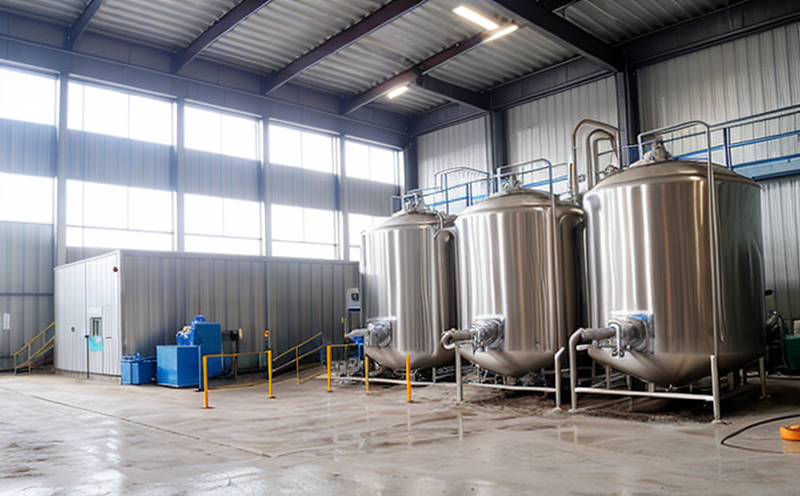ASTM D7066 Petroleum Hydrocarbons Test in Industrial Water
The ASTM D7066 method is a widely recognized procedure for determining petroleum hydrocarbon contamination levels in industrial water. This test is particularly important for industries dealing with water used in manufacturing, processing, or cooling systems as it ensures compliance with environmental regulations and maintains the quality of water processes.
Industrial process waters often come into contact with various chemicals and substances during their use cycle. The presence of petroleum hydrocarbons can lead to numerous issues including fouling of equipment, corrosion, and potential health hazards if not properly managed. ASTM D7066 provides a standardized approach to measure these contaminants accurately.
The test involves extracting hydrocarbon compounds from the water sample using a solvent followed by gravimetric analysis or GC-FID (Gas Chromatography with Flame Ionization Detection). This method allows for precise quantification of total petroleum hydrocarbons present in the industrial water.
One key aspect of ASTM D7066 is its ability to detect even trace amounts of hydrocarbons which are critical for maintaining stringent quality standards. For industries such as petrochemicals, oil refining, and chemical manufacturing, this level of accuracy can be the difference between operational efficiency and costly downtime.
Another important feature of ASTM D7066 is its adaptability to different types of industrial water systems. Whether it's cooling towers, boiler feedwater, or process waters for food & beverage production, the test can be tailored to suit specific needs ensuring that all relevant hydrocarbon compounds are accounted for.
When interpreting results from ASTM D7066 tests, it is crucial to understand what constitutes a 'pass' versus a 'fail'. Generally speaking, if the concentration of total petroleum hydrocarbons falls below specified limits set by industry standards or local regulations then the water sample passes. However, failing this test indicates that immediate corrective actions need to be taken.
Given the importance placed on environmental protection and worker safety across many sectors, compliance with ASTM D7066 becomes essential for any organization handling industrial process waters containing petroleum hydrocarbons.
Why Choose This Test
The ASTM D7066 test offers several advantages that make it an ideal choice for assessing petroleum hydrocarbon contamination in industrial water:
- It ensures accurate and reliable measurement of total petroleum hydrocarbons (TPH) which helps maintain consistent product quality.
- The method is simple yet effective allowing even non-experts to perform the test correctly given proper training.
- Compliance with ASTM D7066 provides confidence that your industrial water meets stringent environmental and health & safety standards.
- The test can be adapted to suit various types of industrial water systems making it versatile enough for different applications within an organization.
By choosing ASTM D7066, you not only enhance the efficiency of your processes but also contribute towards sustainable practices that benefit both your company and the environment. This makes it a smart investment for any quality manager or compliance officer responsible for ensuring water quality in industrial settings.
International Acceptance and Recognition
The ASTM D7066 test enjoys widespread international acceptance due to its robustness and reliability. Many countries have adopted this method as part of their national standards for measuring petroleum hydrocarbon contamination in water. For instance:
- In the United States, many state agencies recognize ASTM D7066 as a valid means of determining TPH levels.
- European Union directives often reference ASTM D7066 when setting limits on allowable concentrations of petroleum hydrocarbons in industrial waters.
- The International Organization for Standardization (ISO) has endorsed ASTM D7066, reflecting its global relevance and utility.
This broad acceptance ensures that any results obtained from an ASTM D7066 test will be widely understood and accepted across borders. Organizations conducting this test can therefore confidently use the outcomes in international trade negotiations or when seeking certification from organizations like ISO 14001 for environmental management systems.
Competitive Advantage and Market Impact
The ASTM D7066 test provides a significant competitive advantage to companies involved in industrial water processes. Here’s how:
- By consistently meeting regulatory requirements through accurate testing, businesses can avoid costly fines and penalties.
- A clean bill of health from an ASTM D7066 test can enhance the reputation of a company among customers who value sustainable practices.
- It allows organizations to identify potential problems early on thereby preventing costly repairs or replacements of machinery damaged by hydrocarbon contamination.
In terms of market impact, companies that adopt rigorous testing protocols like ASTM D7066 may find themselves better positioned to secure contracts with environmentally conscious clients. They can also leverage this capability as a selling point in their marketing strategies appealing directly to those concerned about environmental impact and operational efficiency.
Moreover, by demonstrating leadership in adopting best practices such as ASTM D7066, companies set a benchmark for others within the industry encouraging them to follow suit. This collective effort contributes positively towards overall improvement in industrial water management globally.





